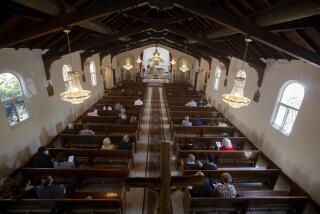More people say they have no religion
Americans are becoming less religious, increasingly turning away from many denominations that once served as their spiritual homes, according to a major national survey released Monday.
The percentage of people who do not claim a religious identity has nearly doubled since 1990, growing to 15% of Americans last year, researchers with the American Religious Identification Survey found.
Mainline Christian denominations, once bulwarks of the religious landscape, have suffered most from the drift.
Methodists, Lutherans and Episcopalians are among the denominations that have seen their ranks decline.
Although 86% of Americans identified as Christians in 1990, just 76% said the same last year, the result of onetime adherents rejecting organized religion, the survey con- cluded.
The broad falloff has occurred as some groups, including Catholics, have seen their overall numbers rise.
But despite growing by 11 million new members since 1990, Catholics now account for a smaller percentage of the U.S. population than they did then -- 25% compared with 26%.
The survey’s principal investigator, sociologist Barry A. Kosmin of Trinity College in Connecticut, described the overall trend as an erosion of the “religious middle ground.”
He said many people appeared to be rebuffing denominations altogether or favoring more conservative evangelical groups that have boosted their relatively small memberships by offering emotional and personalized religious experiences.
Kosmin said the changing religious outlook also reflected an increasingly diverse and complex culture that emphasized greater tolerance for diversity while eschewing respect for authority.
He pointed to one sign of religious detachment -- the fact that 27% of Americans do not expect to have a religious funeral.
“Even the people in the pews are more rebellious than they used to be,” said Kosmin, founding director of the Institute for the Study of Secularism in Society and Culture. “Those you would call ‘the religious’ don’t look like what their grandparents did in terms of their worship style, their ritual behaviors.”
The telephone survey, which included responses from more than 54,000 people in English and Spanish, corroborates findings from other studies of American religious practices.
One 2008 survey, from the Pew Forum on Religion & Public Life, found Americans abandoning ties to organized denominations or switching religious affiliations.
One of the Pew researchers said the comparable findings validated the significant trends shaping the nation’s religious practices.
“American religion is already diverse, and it is likely to become more diverse,” said John Green, a senior fellow with the Pew Forum and a political science professor at the University of Akron in Ohio. “That’s interesting because we tend to think of religion as a pretty stable thing that changes on a generational scale. But there may be more change going on than we had anticipated.”
--
More to Read
Sign up for Essential California
The most important California stories and recommendations in your inbox every morning.
You may occasionally receive promotional content from the Los Angeles Times.









